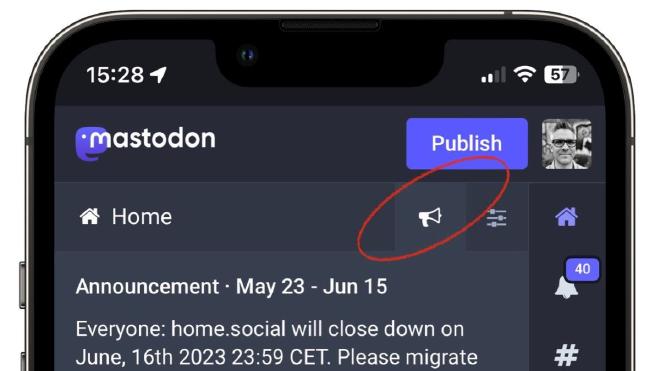About finding a new home(.social)
Table of Contents
A common complaint with Mastodon or the Fediverse in general is that the registration for new users is too complicated because they have to choose a server aka an instance. A common dismissal of this complaint is that most of us have at some point in time successfully chosen an email, cloud storage, or other provider, so we are expected to be able to do so as well for Mastodon.
Recently, Mastodon simplified the sign-up process by suggesting mastodon.social as default instance. Mozilla moved their fediverse experiment mozilla.social to a private beta. These actions seem to acknowledge that the sign-up process and the act of choosing an instance is in fact putting a burden on the end user which he might not be prepared or willing to shoulder1. The oftentimes fast and aggressive dismissal of the aforementioned complaints maybe was a bit premature.
In general, I would tend to agree that simply choosing a server, instance or domain from a list is not an unreasonably demanding task in a sign-up process. Nevertheless, I believe this might adversely effect fediverse adoption amongst average2 users.
Why? Because there is much more to this process than simply picking a name from a list:
Mastodon is instead a galaxy of decentralized and independent networks called instances, each one with its own website, policy and community.
From Mastodon Help
Each of these terms, website, policy, and community, has its own set of implications attached.
website #
Instances are not necessarily the same from a functional or technical perspective. They can run different versions of the mastodon software. The admins will have different upgrade policies or cycles. They might take a different stance on particular feature activations, for example Trending Hashtags. The character limit of posts can be configured differently. The account moving process between instances might be less reliable if one of the instances is not on a current update. Are all these things feasible to be assessed before chosing an instance? Can you expect users to do this?
community #
What is my community? Is it my local community in real life? Should everybody chose an instance related somehow to their home town, region or country? What about topic-centred virtual communities, such as mastodonbooks.net?
Yes, I am a reader. But I am also a music lover (maybe even more so), an occasional gamer, a guy working in tech, and many other interests or topics might apply. Is this the right way to define myself in order to commit to an instance? I would not want to limit, or even focus, my social interactions to certain topics. Instead, I prefer to be inspired by a variety of inputs.
policy #
And now we come to a core issue, governance. Basically, all users of an instance are at the whim of their admin(s). A thing that many newcomers to mastodon would like to leave behind on the birdsite.
There rarely are commitments to site reliability, data protection, let alone service levels. Don’t get me wrong, with many instances operated only due to high engagement from enthusiasts, sacrificing their spare time and other valuable resources, nobody can reasonably expect any guaranteed commitment. And it is to be discussed whether this situation is significantly different for commercial, centralized social networks. But it doesn’t help with chosing an instance either.
Another potentially contentious item are moderation policies. Are they transparent, proactively published, can you align with them? Or are they abritrarily applied, not comprehensible from the outside? I have seen instances being blocked because of a beef of one admin with a user from another instance. In other cases, instances have been defederated because they pursued a different policy with respect to the dreaded content warnings. Are moderation teams providing reasons for banning servers? In many cases, a reason is simply not being given. I prefer transparency and to know whether a defederation took place because of hate speech or bot abuse or else.
Now, in some cases, after searching for an instance under the above considerations, the instance of choice might be closed for new registrations…

.social) instance will be shut down by mid-June. So I need to find a new home and select an appropriate server. And this time, it is more difficult than before, where I more or less simply followed a trusted recommendation from my network. Lacking a compelling alternative, I might move to mastodon.social, and, due to inertia, remain their for quite some time. After all, how often do you want to switch your instance, move your followers and lose your old feed4?
-
obviously, chosing an instance is just one, maybe minor, issue amongst many considerations around the choice of a social network, arguably a major decision factor being tied to your social graph. ↩︎
-
Who needs things to just work, who is short on time and has other challenges to deal with. ↩︎
-
this was announced by the server admin on 23rd May, but since I rarely use the web interface, I did not see the notification until a few days later. Many mobile clients do not seem to show these notifications. ↩︎
-
As explained by vowe, on Mastodon, you don’t own your data. You can export all your data, you will say now. Sure, you can. But all your previous posts will turn into dead links if your instance shuts down for good. ↩︎